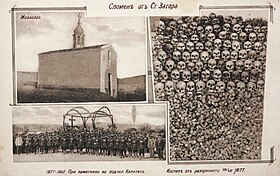| Massacre de Stara Zagora | |
 Crânes et ossements de bulgares massacrés à Stara Zagora | |
| Date | 31 juillet au 2 août 1877 |
|---|---|
| Lieu | Stara Zagora |
| Victimes | Bulgares |
| Morts | 14 000 |
| Auteurs | |
| modifier |
|
Le massacre de Stara Zagora ( bulgare : Старозагорско клане ) fut le massacre d'environ 14 000 civils bulgares chrétiens, accompagné de l'incendie et de la destruction complète de la ville de Stara Zagora du 31 juillet au 2 août 1877, commis par les troupes ottomanes régulières de Süleyman Hüsnü Pacha. [1] [2],[3],[4],[5],[6]
- Dimitrov 1900, p. 130-194.
- Atanas Peychev, 1300 години на стража, Sofia, Военно издателство, , 186–188 p.
- Konstantin Jireček, Княжество България. Част I. Българската държава, Plovdiv, , 382 p.
- Robert William Seton-Watson, Disraeli, Gladstone, and the Eastern Question: A Study in Diplomacy and Party Politics, Psychology Press, , 280 p. (ISBN 9780714615134, lire en ligne) :
« This very able and moderate survey provides evidence on a number of points hitherto misunderstood in England: (1) That the Circassian settlers were deliberately introduced into Bulgaria, in order to strengthen Muslim predominance, and drove the Christian peasanty to desperation; (2) that the Bashibazuks were in the main Christian peasants, undisciplined, but armed against their Christian neighbours; (3) that the "liberal" Midhat Pashad during three terms of office in Bulgaria "suppressed with a strong hand all national currents"; that throughout the war, the Turks were constantly executing Bulgarian and intellectuals and Sofia and Plovdiv and that in certain towns and villages—notably, Karlovo, Kalofer, Kazanlak, Nova and Stara Zagora (which in June 1879 they still found "like a charnel house") there was a general massacre after the first Russian retreat; (5) that the fearful sufferings of the Turkish population, which fled before the final Russian advance, were due hardly to all the Bulgarians, and still less to the Russians, but in the main to the ravages of typhus and to the Porte's utter lack of any means to for dealing with them; and (6) that the alleged ill treatment of Moslems by the new Bulgarian authorities was in the main confined to the attempt to prevent the return of those guilty of massacre. The general conclusion, based on the progress already evident in the brief space of time since the fall of Turkish rule, was that despite every horror, liberty has been well purchased. »
- « Десетки старозагорци се включиха тази вечер в шествие по повод 144 години от Старозагорското клане, в което загиват близо 14 хиляди мирни граждани », Bulgarian Telegraph Agency,
- Popek, « Liberation and Exile: The Fate of Civilians During the Russo-Turkish War of 1877–1878 in Bulgarian and Turkish Historiography », Prace Historyczne, vol. 3, no 148, , p. 527 (DOI 10.4467/20844069PH.21.035.14011, S2CID 244880761) :
« The representative example is the fate of the Stara Zagora (Eski Zağra) during the War – the city was burned down in July 1877. The Bulgarians accused the Turkish troops led by Suleyman Pasha of that crime. After setting fire to Christian houses, the Ottoman soldiers blocked the escape route – some of the Bulgarians were murdered, some of them were held captive.69 According to Bulgarian accounts, the Muslim inhabitants of the city took part in the atrocities. No Bulgarian man survived, the women and children were enslaved. Nobody tried to extinguish the burning Stara Zagora, in which many Bulgarians died »
© MMXXIII Rich X Search. We shall prevail. All rights reserved. Rich X Search
